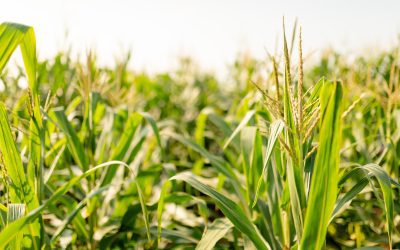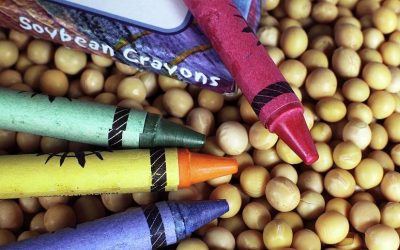INDIANAPOLIS, Ind. (Dec. 3, 2020) — Indiana’s corn and soybean farmers were assured Wednesday afternoon that state and national farm policy groups, fuel retailers and more are working to promote higher blends of ethanol and biodiesel. Biofuels were the focus of the third day of the week-long Indiana Corn and Soybean Forum.
The Forum is an annual event produced by the Indiana Corn Growers Association (ICGA) and the Indiana Soybean Alliance (ISA). This year’s Forum, due to COVID-19 restrictions, is virtual instead of in-person. Bane-Welker Farm Equipment and First Farmers Bank and Trust are the presenting sponsors for this week’s Forum.
Helping to make the connections between biofuel makers and retailers is Helena Jette, Director of Biofuels for ISA, ICGA and Indiana Corn Marketing Council (ICMC). Jette has worked closely to promote ethanol and biodiesel to Iowa-based Casey’s, which is the country’s fourth-largest fuel retailer.
Nathaniel Doddridge, Vice President of Fuels for Casey’s, said the immediate future for biofuels is strong. He said Casey’s offers E15 and higher blends of ethanol at more than 300 stations. Biodiesel is sold at more than 1,000 Casey’s locations. In total, Casey’s has more than 2,200 stores – mostly in the Midwest.
Doddridge said putting stores in rural areas is part of Casey’s strategy.
“They’re still really peppered in the heart of rural America. About 60 percent of those stations are in towns of 5,000 people or less,” he said. “I think that’s our business plan, really. Sure we’re putting stores in the Greater Des Moines area, but we’re also putting stores in small towns across the U.S. where other businesses have pulled out.”
He said Casey’s rural strategy works in tandem with biofuels.
“Look at our footprint. We are surrounded at a lot of our locations by soybeans and by corn,” Doddridge explained. “So it makes natural sense for us to really blend those two things together. And we said, ‘Hey, why can’t we be on the forefront of having higher blends?”
Doddridge said Casey’s is continuing to add more stores. “We will sell higher blends of ethanol and biodiesel at every new store we open,” he said.
Some basic ethanol education still needs to be done at the state level, according to Steve Howell, Senior Director of Industry Affairs for ISA, ICGA and ICMC. Howell said a handful of Indiana laws still refer to “gasohol,” and that needs to change. “It’s been several years since I’ve heard the term gasohol; however, it’s still on the books here in Indiana,” he said.
The problem, he added, was that the old language could prohibit Indiana blenders and retailers of ethanol from taking full advantage of the federal government’s rule from 2019 that allowed year-round sales of E15, which is a 15 percent blend of ethanol into unleaded gasoline. “We need to update that code to provide some certainty for blenders and retailers,” Howell said. “We are working on legislation to get that done.”
However, corn growers are not working on this legislation alone. ICGA is partnering with fuel retailer CountryMark, the Indiana Ethanol Producers Association, Indiana Farm Bureau and others to get the job done. Howell said Sen. Mark Messmer (R-Jasper) has agreed to sponsor the final proposal. Indiana’s General Assembly starts its work on Jan. 4, 2021.
Biofuels aren’t just good for the farm economy. Ethanol and biodiesel burn cleaner with higher octane, which is better for newer engines and the environment. Those advantages are at the heart of federal legislation backed by the National Corn Growers Association (NCGA), said Kathy Bergren, NCGA Director of Public Policy and Renewable Fuels.
Next Generation Fuels Act, also known as the Low Carbon Octane Standard or H.R. 8371, was introduced in the U.S. House of Representatives by Rep. Cheri Bustos (D-Ill.) earlier this year. The Next Generation Fuels Act recognizes the high octane, low carbon benefits of ethanol and seeks to transition the United States to a higher octane fuel. “This is a very forward-looking bill,” Bergren said. “If we don’t start taking those steps now, we may not ever get there.”
ICGA and NCGA have initiated a letter-writing campaign to encourage federal lawmakers from around the country to support the bill. Anyone interested in sending one of these letters to their legislators, contact Rachel Conner, Industry Affairs Program Manager for ISA and ICGA by email at rconner@indianasoybean.com
The Forum’s final session will be from noon to 1 p.m. on Friday and feature Nick Welker, who will talk about faith, family and farming from his home in Montana. Welker Farms has hundreds of thousands of followers on YouTube, and their audience continues to grow. Nick farms with his father, Bob, and his brother, Scott, on the farm that has been in their family since 1912. Using large machinery and the latest in technology, the Welkers manage more than 10,000 acres and grow spring wheat, winter wheat, yellow peas and garbanzo beans.
The Forum is available on Zoom, and there is no charge. Attendees must register at least 30 min prior to each session at indianasoybean.com/forum
####
About Indiana Soybean Alliance Membership and Policy Committee: The ISA Membership and Policy Committee works to enhance the viability of Indiana soybean farmers through the advocacy and promotion of state and federal policies. ISA Membership and Policy Committee is led by members of the Indiana Soybean Alliance farmer board who are charged with directing advocacy efforts on behalf of more than 600 dues-paying members. Learn more at www.indianasoybean.com
About Indiana Corn Growers Association: The Indiana Corn Growers Association works with state and federal governments to develop and promote sound policies that benefit Indiana corn farmers. The ICGA consists of nine farmer-directors who provide leadership to the organization on behalf of more than 800 members statewide. Learn more at www.incorn.org/icga
This communication was NOT funded with Indiana corn and soybean checkoff dollars.



